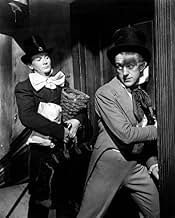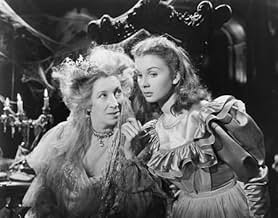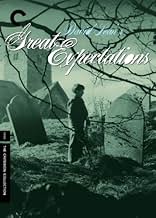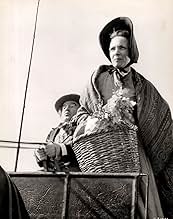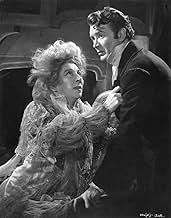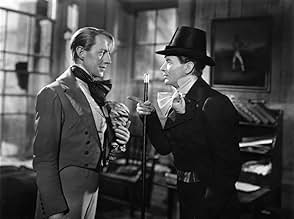IMDb-BEWERTUNG
7,8/10
27.664
IHRE BEWERTUNG
Ein bescheidenes Waisenkind wird mit Hilfe eines unbekannten Wohltäters plötzlich ein Gentleman.Ein bescheidenes Waisenkind wird mit Hilfe eines unbekannten Wohltäters plötzlich ein Gentleman.Ein bescheidenes Waisenkind wird mit Hilfe eines unbekannten Wohltäters plötzlich ein Gentleman.
- 2 Oscars gewonnen
- 11 Gewinne & 4 Nominierungen insgesamt
Tony Wager
- Young Pip
- (as Anthony Wager)
O.B. Clarence
- The Aged Parent
- (as O. B. Clarence)
Empfohlene Bewertungen
When David Lean directed Great Expectations, he used black and white, even though color was available. From the very first scene, you see that the black and white brings out a quality in the film, that wouldn't have been achieved with color. The black and white makes the film seem simpler than it really is. Great Expectations is a film, which ends very nicely for the characters, but their journeys throughout the film are not.
Pip sees himself for the rude snob he became, and Estella prides herself for being a heartless, ruthless bitch (for lack of a better word), and Miss Havisham is cold, and simply out to destroy men. The only person in this film who is not arrogant, or evil is the simple Joe.
I am far from a film expert. Infact, I only watched this movie because I am studying Great Expectations at school. However, after hours of in-depth discussion, there is so much more to this film than meets the eye. My favorite scenes are those in the first quarter of an hour. Lean's use of Silhouettes gives the search for the two escaped convicts a feel of war, and creates an atmosphere of tension very well. It also introduces the key characters in the story excellently.
As far as the story goes, I found it much easier on the head to watch than the book was to read. While it wasn't close in length to books i've read before (I think it's shorter than my little brother's "Harry Potter" books), it took me close to 30 hours to read. The movie compacts the majority of the book into 2 hours of film. The exclusion of characters like Orlick I have no problem with, as they are nearly completely irrelevant to the story. Lean explains the death of Pip's sister in less than 10 seconds, while the book takes somewhere in the region of 10 pages.
The acting is excellent. Alec Guinness was the only actor I had heard of, and that was only thanks to George Lucas. John Mills was interesting to watch, and after seeing the movie, I didn't know weather to like Pip for how he ended up, or to see him for the nasty person he had changed into (and come back from).
Only when watching it for the second time, did i realise the thought behind the direction. When Magwitch reappears, the atmosphere from their first meeting is created exactly; even the wind sounds the same. The sets were also incredible, and remade 19th century England perfectly. Ms. Havisham's `Statis House' was particularly memorable for me, as it is exactly how I pictured it from reading.
David Lean's Great Expectations set a benchmark in 1946 for great movies. It was nominated and won several Oscars, and is still enjoyed today. Every aspect of this film was enjoyable, it tells a great story, and if you look closer, you will appreciate the art of film making a little more, as I have.
Pip sees himself for the rude snob he became, and Estella prides herself for being a heartless, ruthless bitch (for lack of a better word), and Miss Havisham is cold, and simply out to destroy men. The only person in this film who is not arrogant, or evil is the simple Joe.
I am far from a film expert. Infact, I only watched this movie because I am studying Great Expectations at school. However, after hours of in-depth discussion, there is so much more to this film than meets the eye. My favorite scenes are those in the first quarter of an hour. Lean's use of Silhouettes gives the search for the two escaped convicts a feel of war, and creates an atmosphere of tension very well. It also introduces the key characters in the story excellently.
As far as the story goes, I found it much easier on the head to watch than the book was to read. While it wasn't close in length to books i've read before (I think it's shorter than my little brother's "Harry Potter" books), it took me close to 30 hours to read. The movie compacts the majority of the book into 2 hours of film. The exclusion of characters like Orlick I have no problem with, as they are nearly completely irrelevant to the story. Lean explains the death of Pip's sister in less than 10 seconds, while the book takes somewhere in the region of 10 pages.
The acting is excellent. Alec Guinness was the only actor I had heard of, and that was only thanks to George Lucas. John Mills was interesting to watch, and after seeing the movie, I didn't know weather to like Pip for how he ended up, or to see him for the nasty person he had changed into (and come back from).
Only when watching it for the second time, did i realise the thought behind the direction. When Magwitch reappears, the atmosphere from their first meeting is created exactly; even the wind sounds the same. The sets were also incredible, and remade 19th century England perfectly. Ms. Havisham's `Statis House' was particularly memorable for me, as it is exactly how I pictured it from reading.
David Lean's Great Expectations set a benchmark in 1946 for great movies. It was nominated and won several Oscars, and is still enjoyed today. Every aspect of this film was enjoyable, it tells a great story, and if you look closer, you will appreciate the art of film making a little more, as I have.
The Dickens novel is given classic treatment in David Lean's "Great Expectations". The opening scene is so atmospheric it sets the tone for the convoluted story to follow. The earlier scenes with young Pip are the most enjoyable for me--especially those involving Estella (Jean Simmons) and Miss Havisham (Martita Hunt).
Brilliant performances from all concerned. John Mills is wholly satisfying as the adult Pip and Valerie Hobson as the adult Estella--but it is Martita Hunt's Miss Havisham, sitting among the ruined finery of a wedding that never took place, everything exactly the way it was on that fateful day--and waging war on men ever since--that lingers in the memory.
Some of the best black and white photography seen until that time and an absorbing story with twists and surprises that have logical explanations. Compares favorably with the other great British film, "Oliver Twist" and, by all means, recommended viewing.
Not only worthy of its Best Picture nomination, it should have won over "Gentleman's Agreement" which now seems preachy and artificial.
Brilliant performances from all concerned. John Mills is wholly satisfying as the adult Pip and Valerie Hobson as the adult Estella--but it is Martita Hunt's Miss Havisham, sitting among the ruined finery of a wedding that never took place, everything exactly the way it was on that fateful day--and waging war on men ever since--that lingers in the memory.
Some of the best black and white photography seen until that time and an absorbing story with twists and surprises that have logical explanations. Compares favorably with the other great British film, "Oliver Twist" and, by all means, recommended viewing.
Not only worthy of its Best Picture nomination, it should have won over "Gentleman's Agreement" which now seems preachy and artificial.
This adaptation of Charles Dickens's classic novel, directed by David Lean from a script he co-adapted, and photographed by Guy Green, is a miracle of invention, economy and detail. Every piece on every set; every line of dialogue; every gesture and line reading of every actor; every black-and-white frame of this beautiful film seems perfect. Dickens's characters, situations and themes are all vividly dramatized. Pip, Pocket, Joe, Mr. Jaggers, Magwitch andunforgettablyMiss Havisham, are all here and all ready to move, amuse, frighten and entertain anyone willing to spend time with them.
I haven't read the book since I was thirteen. I vividly remember Miss Havisham, but I don't remember noting the contrast between her and Magwitch, the ex-convict. She becomes bitter and vengeful after a great heartbreak; he becomes great of heart through one small act of kindness. That's what made the movie for me this time; but clearly there's richness to spare for future viewings.
There is so much here not only for Dickens fans, but for anyone who loves movies. I especially liked that shot from Pip's point of view as he becomes sick. It's the kind of crazy effect beloved of filmmakers, too; but I love it not so much for itself, but for being the right shot at the right moment. Some directors hide, others show off, but directors like David Lean know how to do both and know when to do which.
I haven't read the book since I was thirteen. I vividly remember Miss Havisham, but I don't remember noting the contrast between her and Magwitch, the ex-convict. She becomes bitter and vengeful after a great heartbreak; he becomes great of heart through one small act of kindness. That's what made the movie for me this time; but clearly there's richness to spare for future viewings.
There is so much here not only for Dickens fans, but for anyone who loves movies. I especially liked that shot from Pip's point of view as he becomes sick. It's the kind of crazy effect beloved of filmmakers, too; but I love it not so much for itself, but for being the right shot at the right moment. Some directors hide, others show off, but directors like David Lean know how to do both and know when to do which.
I read the novel decades ago, but from what I remember the major points and most of the minor points of the novel are intact. The novel and the film weave a tale of a 19th century England completely lacking in compassion, and that always went doubly so for orphans such as Pip, yet he does encounter more than his share of good luck.
Of course the most interesting character in the novel is Miss Haversham. In the film as in the novel she is dumped at the altar on her wedding day in her youth and has harbored a grudge against the entire male sex since then and has lived as though stuck in that day for decades, still wearing her rotting wedding dress. What I don't understand is why the film does not include her being financially defrauded by her fiance as the novel does. The novel weaves a tale of an unbelievably small world, but the film omits a couple of the more unbelievable plot turns to its credit.
The lawyer, Mr. Jaggers, who attends to Pip's affairs when he is in London, is also a most interesting character. He has a hangman's noose as a souvenir in his office and also seems to be actively collecting the death masks of the recently executed as a new one pops up every time Pip visits him. Yet when he discusses the matter of the death penalty and criminal justice in England Jaggers truly seems to get the cruel randomness of those institutions.
One thing I can say without spoiling anything is how completely unrecognizable Alec Guinness is as Herbert Pocket, Pip's roommate in London. He doesn't even have that trademark gravelly voice at this point, his first credited film appearance.
I don't even like costume dramas or period pieces, but I highly recommend this one. The fine acting by the cast and Lean's direction really drew me into the story.
Of course the most interesting character in the novel is Miss Haversham. In the film as in the novel she is dumped at the altar on her wedding day in her youth and has harbored a grudge against the entire male sex since then and has lived as though stuck in that day for decades, still wearing her rotting wedding dress. What I don't understand is why the film does not include her being financially defrauded by her fiance as the novel does. The novel weaves a tale of an unbelievably small world, but the film omits a couple of the more unbelievable plot turns to its credit.
The lawyer, Mr. Jaggers, who attends to Pip's affairs when he is in London, is also a most interesting character. He has a hangman's noose as a souvenir in his office and also seems to be actively collecting the death masks of the recently executed as a new one pops up every time Pip visits him. Yet when he discusses the matter of the death penalty and criminal justice in England Jaggers truly seems to get the cruel randomness of those institutions.
One thing I can say without spoiling anything is how completely unrecognizable Alec Guinness is as Herbert Pocket, Pip's roommate in London. He doesn't even have that trademark gravelly voice at this point, his first credited film appearance.
I don't even like costume dramas or period pieces, but I highly recommend this one. The fine acting by the cast and Lean's direction really drew me into the story.
I came to watch this film with no knowledge of the book, having never read it and only the vaguest knowledge of a couple of the characters - Magwitch the escaped convict and the jilted Miss Haversham. I had absolutely no idea how events would turn out or what would happen to the characters involved. Good for me - no baggage!!
Taken, then, in its own right I can say that I was quite staggered at the overall quality of this film in every respect and from the very opening shots: The acting, cinematography, costumes, sets, lighting, effects etc. etc. were all perfect and gave no hint of the film's vintage. Surprise surprise (or maybe no surprise), the storyline was quite superb - the ripe 'Dickensian' dialogue was a pleasure to hear and the plot was intelligent and interesting while maintaining a steady pace throughout.
All in all, a very pleasant experience for me and I'm glad it eventually found its way onto my radar!
So - a timeless masterpiece in my opinion and well worth watching by anyone looking for a break from modern CGI-laden disaster/action movies or who do not want to see yet another instance of the Americans saving the world from extra-terrestrial menace.
Nine out of ten without a moment's hesitation....
Taken, then, in its own right I can say that I was quite staggered at the overall quality of this film in every respect and from the very opening shots: The acting, cinematography, costumes, sets, lighting, effects etc. etc. were all perfect and gave no hint of the film's vintage. Surprise surprise (or maybe no surprise), the storyline was quite superb - the ripe 'Dickensian' dialogue was a pleasure to hear and the plot was intelligent and interesting while maintaining a steady pace throughout.
All in all, a very pleasant experience for me and I'm glad it eventually found its way onto my radar!
So - a timeless masterpiece in my opinion and well worth watching by anyone looking for a break from modern CGI-laden disaster/action movies or who do not want to see yet another instance of the Americans saving the world from extra-terrestrial menace.
Nine out of ten without a moment's hesitation....
Wusstest du schon
- WissenswertesSir Alec Guinness admired the way Sir David Lean directed him, singling out a close-up in which he had to laugh out loud, and which he struggled to make look unmanufactured. Lean told him to forget about the whole thing, sat by his side, and made a little signal to the camera to start turning in the course of the conversation. He said something which made Guinness laugh and then said, "Cut." Guinness: "So he got this shot on a totally false premise, but thank God. I don't think I would have ever achieved it otherwise."
- PatzerAt the end, when Pip is persuading Estella to leave Satis House with him, a 'Chad' is clearly visible drawn on the screen behind him (Chads were a popular form of graffiti in the 1940s - a character with a big nose looking over a wall). Chad is a British term; the American equivalent would be Kilroy, as in 'Kilroy was here'.
- Crazy CreditsThe identity of the actress playing Molly is never revealed, because this would constitute a spoiler.
- Alternative VersionenIn some prints, after the fifteen minute "convict episode" at the beginning of the film ends, a voice-over by the adult Pip (John Mills) says, "it was a year later", as Mrs. Joe arrives home in the carriage. As now usually shown, there is no voice-over in this sequence.
- VerbindungenFeatured in Moscow in Madrid (1965)
Top-Auswahl
Melde dich zum Bewerten an und greife auf die Watchlist für personalisierte Empfehlungen zu.
Details
- Erscheinungsdatum
- Herkunftsland
- Offizieller Standort
- Sprache
- Auch bekannt als
- Geheimnisvolle Erbschaft
- Drehorte
- St Mary's Marshes, Kent, England, Vereinigtes Königreich(opening sequence - Pip and Herbert Pocket ride in rowboat)
- Produktionsfirma
- Weitere beteiligte Unternehmen bei IMDbPro anzeigen
Box Office
- Budget
- 350.000 £ (geschätzt)
- Weltweiter Bruttoertrag
- 33.408 $
- Laufzeit
- 1 Std. 58 Min.(118 min)
- Farbe
- Seitenverhältnis
- 1.37 : 1
Zu dieser Seite beitragen
Bearbeitung vorschlagen oder fehlenden Inhalt hinzufügen


